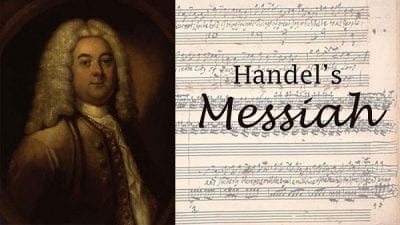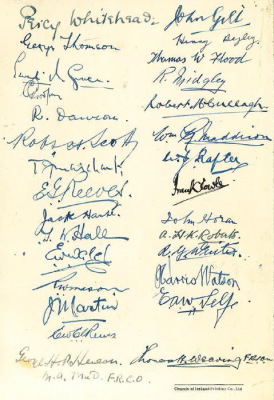
By Sarah Mac Donald - 08 April, 2020
 The Church of Ireland’s Archives is currently featuring documentation relating to the role of two Dublin choirs in the very first performance of Handel’s Messiah in April 1742.
The Church of Ireland’s Archives is currently featuring documentation relating to the role of two Dublin choirs in the very first performance of Handel’s Messiah in April 1742.
One of the best known musical works of the Baroque period, Messiah was first performed on 13th April 1742 in Neal’s Musick Hall, Fishamble Street, Dublin, in the shadows of Christ Church Cathedral.
The great composer had contacted St Patrick’s and Christ Church Cathedrals in early March 1742 to sound them out about the possibility of their choirs participating in the premiere of his Oratorio.
Permission was granted to utilise the services of 16 men and 16 boy choristers from both cathedrals, with some of these men performing solo parts.
It is a testament to the high standards associated with both choirs that so many were chosen to be part of such an eminent production in front of 700 patrons.
The orchestra comprised strings, two trumpets and timpani. Handel had his own organ shipped to Ireland for the performance.
Three charities were to benefit from the performance: the prisoners’ debt relief, Mercer’s Hospital, and the Charitable Infirmary.
Two hundred years later on 13th April 1942, in the midst of World War II/the Emergency, this relationship between the Church of Ireland and Handel’s masterpiece was marked by a special celebratory performance of Messiah.
The bicentenary of the first performance was honoured with a performance in St Patrick’s Cathedral and another performance in Christ Church Cathedral the following day on 14th April 1942.
George Frideric Handel, was born in Halle, in Germany in 1685. On moving to Great Britain, he developed strong ties with the Church of England and worked extensively with religious bodies to showcase his new works. He became a naturalised British subject in 1727.

An image showing the signatures of the members of the cathedrals’ choirs who performed in the 200th anniversary celebration of Handel’s Messiah. From RCB Library C2/9/1.
In 1741, the decision was made to give a season of concerts in Dublin towards the end of this year, and in to early 1742.
These were performed in the Musick Hall, Fishamble Street, but did not feature Messiah, nor any version of the oratorio.
The concerts proved phenomenally popular and Handel continued to work in Dublin during the spring of 1742.
While Handel’s Messiah originated from his time in London, it matured and was appreciated in Dublin.
It is said that Handel, writing to the librettist of Messiah, Charles Jennens, during Christmas 1741, noted “the politeness of this generous nation cannot be unknown to you”.
Handel himself was residing in a house on the corner of Abbey Street and Liffey Street and used this premises as a residence and ticket-office.
The Church of Ireland’s RCB Library holds extensive collections on both St Patrick’s and Christ Church Cathedrals, and there are detailed and important accounts relating to their choirs.
One example is RCB Library C2/9/1, which is a booklet produced in the 20th century showing the original octavo edition of Handel’s Messiah in vocal score, edited by WT Best (London: Novello and Company).
What makes this such a unique item is that the notice for the cathedral concerts in April 1942 is included, along with a full list of those who performed originally, as well as those performing in the 200th anniversary celebration.
Also saved is a page, on Church of Ireland Printing Co Ltd paper, showing the signatures of those ‘gentlemen of the choir’ who performed in 1942.
Live streaming of Masses and Services from churches in Ireland and the UK can be found here: http://churchservices.tv